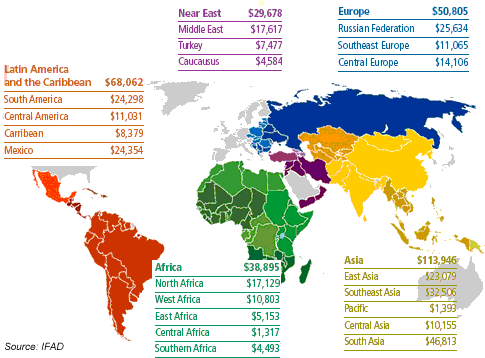The financial crisis that is in full swing in the world’s developed countries is only beginning to reach the poorest, and labor migrants, with feet in both worlds, are among the first to feel it.
Flows of migrant money to developing countries, known as remittances, began to slow this fall, the first moderation after years of double-digit growth, according to the World Bank. The slowdown is expected to turn into a decline of 1 to 5 percent in 2009, when the full effect of the crisis hits.
Some are already feeling it. Mexico, for example, is likely to have a 4 percent decline in the flows of migrant money in 2008, according to World Bank estimates. The biggest declines next year are expected in the Middle East and North Africa, because of economic slowdowns in the Persian Gulf and Europe.
 According to IFAD:
According to IFAD:The driving force behind this phenomenon is an estimated 150 million migrants worldwide. They sent some US$300 billion to their families in developing countries during 2006, typically US$100, US$200 or US$300 at a time, through more than 1.5 billion separate financial transactions.Comment: Boxing Day, December 26th, is the traditional day in England and other countries of the Commonwealth for the affluent to give gifts to those who are less affluent.
I suspect that there will be considerable pressure to reduce foreign aid to developing nations during the financial crisis. Remittances are a more important source of funding for many developing nations, and these too will be decreasing. Exports are also being reduced for developing nations as demand is being reduced by the crisis. Thus poverty -- hunger, inadequacy of health services, unemployment, underemployment, misery -- are likely to increase for the poor.
Perhaps Boxing Day would be a good time to rededicate ourselves to helping the poor. A note to your legislator might be in order. JAD
No comments:
Post a Comment